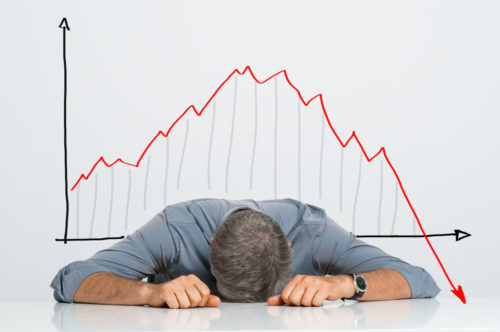The 2008 financial crisis had a negative effect on small businesses across the nation. While businesses alike were affected, small businesses that relied on banks for credit were hit the hardest.
The initial effects were evident, but no one knew how the financial crisis would continue to affect small businesses in the years after the fact.
Table of Contents
Effects of the Recession on Small Business
The recession affected a number of aspects of small business, from how much they could borrow to the number of jobs small businesses created. Below, we’ll dissect each aspect of the recession’s effect.
Lending
At the time of the crash, banks were lending $659 billion to small businesses. Those investments plummeted by 18% to only $543 billion in June 2011. Banks decreased the amount of commercial lending by a significant amount.
According to a study on small business lending during the recession, banks reported tighter underwriting standards for small businesses during that time. The same study concluded that most financial institutions considered lending to small businesses riskier and costlier than lending to larger firms; in 2008, the number of big banks lending to small businesses was almost non-existent. In the aftermath of the financial crisis, small business loan originations dropped 40%. Without bank credit, small businesses couldn’t grow.
Startups
The recession also decreased the number of startup companies that entered the market. Though there has been a significant turnaround in the number of startups opening, the startup market is still not where it was prior to the recession. Census Bureau statistics from the past few decades show a downward trend in the share of jobs created by startups even before the recession. In fact, the Census Bureau’s Business Dynamics Statistics (BDS) reported that startup companies created 3.4 million jobs in 2006. That number decreased to 2.5 million in 2015.
Business Closures
In 2008 costs were rising and profits were plummeting for small businesses. At a time when credit was virtually unavailable to them, small businesses had no other choice but to shut down.
The economic downturn of 2008 forced many businesses to close their doors. More specifically, between 2008 and 2010, the Business Journals of U.S. Census Bureau reported that 170,000 small businesses shut down as a result of the recession.
Employee Layoffs
There was also a significant increase in employee layoffs during the 2008 recession. In an attempt to remain in business, some companies chose to let certain employees go to cut back on payroll costs.
According to the BLS, “In December 2007, the national unemployment rate was 5%, and it had been at or below that rate for the previous 30 months. At the end of the recession, in June 2009, it was 9.5%.” This increase was caused by the uptick in employee layoffs as a result of the recession.
Despite the loss of jobs as a result of the recession, small businesses made a comeback after the fact. In 2018, the Small Business Administration reported 30.2 million small businesses in the United States with 58.9 million employees.
Job Creation
Following the recession, small business job creation declined significantly. The Federal Reserve Bank of New York reported that “jobs declined 10.4% in establishments with fewer than fifty employees, compared with 7.5% in businesses with fifty-plus.”
The Federal Reserve also explains the importance of small businesses in relation to job creation. Because small businesses grow at a more rapid pace than large ones, they’re able to create more jobs more frequently than major corporations. When the recession hit and small businesses had to close their doors, this ultimately impacted the job economy.
Boom and Bust
Despite the economic bust in 2008, small businesses have managed to make a comeback. If you own a small business, here’s what you can do to protect yourself in economic booms and busts.
During economic booms, small businesses should:
- Keep the cash flow continuous. Make your small business recession-proof by knowing your expenses, encouraging repeat customers, and pre-selling items if possible.
- Look for places you can cut costs. Whether you’re stocking too much inventory that doesn’t sell or you’re paying too much on your electricity bill, search for places where you can be spending money more wisely.
- Don’t diversify if you don’t have to. Stick to doing what you know best instead of trying to offer the hottest commodities. Spreading yourself too thin could be detrimental if and when an economic bust occurs.
- Cultivate relationships with your current clients. Rather than take risks or spend money on targeting new consumers, focus on the ones you have and turn them into lifelong customers.
- Maintain your personal credit. In the event of an economic bust, your good credit could be what helps you get a loan.
During economic busts, small businesses should:
- Cut down on expenses wherever possible. This could mean only operating a few days a week to save on operational costs. In most cases, cutting down means limiting your discretionary spending. From office birthday cakes to subscription services, be mindful of excessive spending.
- Negotiate costs; if you rent an office space, speak with your landlord about lowering the rent. If you cater to clients that offer services you need, barter with them for a better deal or exchange of services during difficult economic times. In some cases, you may be able to negotiate your billing terms, too.
- Incentivize your customers. In an effort to continue cash flow, offer discounts for customers who make payments early.
- Be open and honest with your employees. If your company is suffering as a result of economic hardship, everyone involved in the operation of the company should be made aware.
Image Source: https://depositphotos.com/





